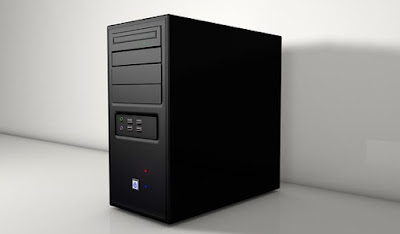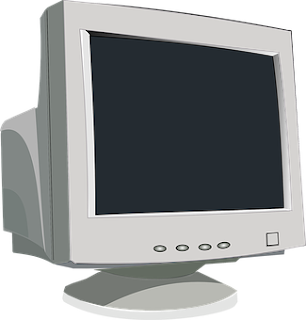Classes of Computers
What we often talk about topics in computing or about
computers in general we don't ask ourselves a fundamental question which is
what is a computer I mean sure we see these devices around us but have you ever
wondered whether there are different types of computers out there in fact as it
turns out whatever device there's a very high chance you are actually using
what can be classified as a microcomputer these aren't terms that we hear very
often in day-to-day speech but in fact computers can be classified into four
distinct classes in this episode we're gonna look some what into history and try
to understand these classifications of computers you're watching another random
they have four classes of computers supercomputers mainframe computers meaning
computers and microcomputers these are terms that you don't hear very often
sometimes you do it movies but what we're gonna do is we're gonna break down
each one of these categories and try to understand what's going on with each
but even before we do that first of all what is a computer as it turns out
there are certain characteristics you can look out for that tells you what
exactly is a computer first of all we can characterize computers by their
behavior a computer is able to actually run programs and what this means is
it's able to look at what is essentially a list of instructions and then
execute them one by one it of course needs to be able to do so in a
well-defined and predictable manner and what this means is every time your
computer sees a particular instruction it has to react in a certain way and not
in some random unpredictable manner a computer should be able to respond to
user input by producing some kind of put and in most cases computer should be
able to read from and write to storage in terms of its common components a
computer should have a CPU and when I'm talking about CPU I'm talking
about that component on the motherboard not the common misuse of the term I mean I've heard of that term being used to refer to you know the entire chances of the unit and that's not entirely correct
The CPU is a component in a computer that basically processes instructions as well as performs calculations a computer has memory also known as RAM memory is used to basically temporarily store the running state of applications it can be accessed very quickly and that's why basically program states as well as operating system Steve has thought that however it doesn't actually hold the data in the long term once it loses power the data is lost as well and that is why on top of Ram a computer also needs to have storage Sarich can of course be a very wide variety of things like had this SSDs all the way down to all the things like for me this so these are some of the common components and characteristics of a computer having said that let us now move on to look at the four classes of computers first and foremost a supercomputer you've probably heard of this you know it movies on TV it's always this scary roomful of machines and supposed to be doing something like taking over the world well super computers do actually exist in real life though chances are they use force like me less than Esther purpose in fact what makes a super computer super is in its high processing capacity it's supposed to be able to handle large amounts of information do large amounts of processing in a short period of time while in the past super computers are specially engineered pieces of equipment you know they have their own custom-made process up what is more common these days is to simply put together a large number of off-the-shelf processors so that is an interesting point note in fact your supercomputers aren't really that special there a whole lot of processes put together in fact fastest supercomputer in a world right now puts together 32,000 Intel Xeon processors which are in fact processors that are available off-the-shelf this large amount of computational power is normally used to run simulations no things like testing stress or aerodynamics of a product or running things like traffic simulations all these operations are very calculation intensive which is why it makes sense to use something with a lot of computational power to actually run this and that is a supercomputer let's now move one size down to take a look at a mainframe computer well the emphasis of a supercomputer is in its high processing power a mainframe computer has slightly different requirements a mainframe needs to be the backbone of a large organizations tech capacity and as you would expect its focus is on things like high reliability as well as the ability to serve a large number of users at the same time mainframe computers are usually large expensive cabinets and as mentioned its emphasis is on being reliable it achieves this through several methods and one of them is through redundancy one very good example of redundancy is what is known as read which stands for redundant array of independent disks basically the idea is this when you have multiple drives you can actually write the same data into multiple drives and this creates duplicates or in other words redundant copies of the same data this converts several advantages first and foremost of course if one of the drives fail you don't lose your data because there is another copy raid may also help speed up reads for example if multiple people were requesting you know different paths same data different disk can service those different requests instead of having all requests go to the same this so there is a speed-up in that regard as well so basically this is mostly an example to
show you how a redundancy is useful when it comes to reliability and that is a mainframe computer let us move one size down again to a mini computer despite the name mini computers and of that small basically you can think of a mini computer as a smaller you know a scaled-down and cheaper version of a mainframe computer and even if it doesn't have you know the same amount of processing power its purpose remains generally the same and that is to serve multiple users and to perform multiple tasks at the same time this is one of the classes that is starting to have many blurred lines in a sense set a larger mini computer may not be easily distinguishable from a smaller mainframe of course by a similar vein very powerful microcomputers may be comparable to smaller scale mini computers so it is a class that is so in between that it's starting to get a little bit less used but of course the idea is still there the whole point of a mini computer is to be basically a smaller mainframe and in terms of responsibilities they are the same so now let's move on to a micro computer which is of course what we are the most familiar with the key distinguishing feature of a micro computer and these when define you know in academic texts is the fact that let's design to serve just one user at a time obviously that's not entirely true I mean you can of course set up say a web server or game server on your computer and technically your home computer is serving more than one user but of course the definition works in a general case most of the time your personal computer is just for one user of course other characterizing features of a micro computer of course it's smaller size and its lower cost at least you know in comparison to the other classes in fact if you want to be even more precise a micro computer can be further broken down into two classes which are workstations and personal computers the general gist of the idea for these two classifications is workstations are supposed to be more powerful they are used in a workplace for commercial purposes whereas personal pootis normally shortened to pcs exist at home and I use for entertainment and lighter tasks and there you go these are the classes of computers so well if these terms come up most of the time in a movie you know the difference as mentioned much of these terms aren't really used that much in our day to day speech in fact even as a computer science students these terms will never formally define to us at least...
about that component on the motherboard not the common misuse of the term I mean I've heard of that term being used to refer to you know the entire chances of the unit and that's not entirely correct
The CPU is a component in a computer that basically processes instructions as well as performs calculations a computer has memory also known as RAM memory is used to basically temporarily store the running state of applications it can be accessed very quickly and that's why basically program states as well as operating system Steve has thought that however it doesn't actually hold the data in the long term once it loses power the data is lost as well and that is why on top of Ram a computer also needs to have storage Sarich can of course be a very wide variety of things like had this SSDs all the way down to all the things like for me this so these are some of the common components and characteristics of a computer having said that let us now move on to look at the four classes of computers first and foremost a supercomputer you've probably heard of this you know it movies on TV it's always this scary roomful of machines and supposed to be doing something like taking over the world well super computers do actually exist in real life though chances are they use force like me less than Esther purpose in fact what makes a super computer super is in its high processing capacity it's supposed to be able to handle large amounts of information do large amounts of processing in a short period of time while in the past super computers are specially engineered pieces of equipment you know they have their own custom-made process up what is more common these days is to simply put together a large number of off-the-shelf processors so that is an interesting point note in fact your supercomputers aren't really that special there a whole lot of processes put together in fact fastest supercomputer in a world right now puts together 32,000 Intel Xeon processors which are in fact processors that are available off-the-shelf this large amount of computational power is normally used to run simulations no things like testing stress or aerodynamics of a product or running things like traffic simulations all these operations are very calculation intensive which is why it makes sense to use something with a lot of computational power to actually run this and that is a supercomputer let's now move one size down to take a look at a mainframe computer well the emphasis of a supercomputer is in its high processing power a mainframe computer has slightly different requirements a mainframe needs to be the backbone of a large organizations tech capacity and as you would expect its focus is on things like high reliability as well as the ability to serve a large number of users at the same time mainframe computers are usually large expensive cabinets and as mentioned its emphasis is on being reliable it achieves this through several methods and one of them is through redundancy one very good example of redundancy is what is known as read which stands for redundant array of independent disks basically the idea is this when you have multiple drives you can actually write the same data into multiple drives and this creates duplicates or in other words redundant copies of the same data this converts several advantages first and foremost of course if one of the drives fail you don't lose your data because there is another copy raid may also help speed up reads for example if multiple people were requesting you know different paths same data different disk can service those different requests instead of having all requests go to the same this so there is a speed-up in that regard as well so basically this is mostly an example to
show you how a redundancy is useful when it comes to reliability and that is a mainframe computer let us move one size down again to a mini computer despite the name mini computers and of that small basically you can think of a mini computer as a smaller you know a scaled-down and cheaper version of a mainframe computer and even if it doesn't have you know the same amount of processing power its purpose remains generally the same and that is to serve multiple users and to perform multiple tasks at the same time this is one of the classes that is starting to have many blurred lines in a sense set a larger mini computer may not be easily distinguishable from a smaller mainframe of course by a similar vein very powerful microcomputers may be comparable to smaller scale mini computers so it is a class that is so in between that it's starting to get a little bit less used but of course the idea is still there the whole point of a mini computer is to be basically a smaller mainframe and in terms of responsibilities they are the same so now let's move on to a micro computer which is of course what we are the most familiar with the key distinguishing feature of a micro computer and these when define you know in academic texts is the fact that let's design to serve just one user at a time obviously that's not entirely true I mean you can of course set up say a web server or game server on your computer and technically your home computer is serving more than one user but of course the definition works in a general case most of the time your personal computer is just for one user of course other characterizing features of a micro computer of course it's smaller size and its lower cost at least you know in comparison to the other classes in fact if you want to be even more precise a micro computer can be further broken down into two classes which are workstations and personal computers the general gist of the idea for these two classifications is workstations are supposed to be more powerful they are used in a workplace for commercial purposes whereas personal pootis normally shortened to pcs exist at home and I use for entertainment and lighter tasks and there you go these are the classes of computers so well if these terms come up most of the time in a movie you know the difference as mentioned much of these terms aren't really used that much in our day to day speech in fact even as a computer science students these terms will never formally define to us at least...







No comments:
Post a Comment